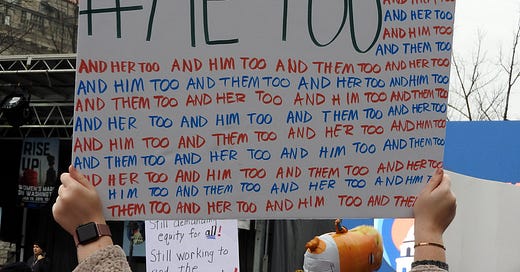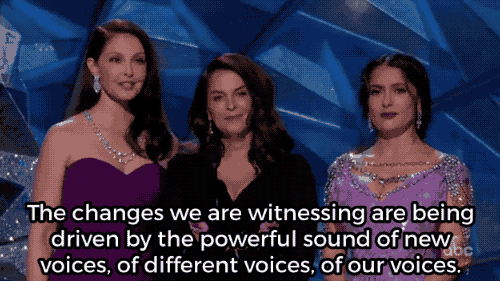Some Thoughts on Harvey Weinstein's Retrial and the So-Called End of #MeToo
After his conviction was overturned, a lot of people worried that the hard work of #MeToo had come to an end. But I'm not sure it ever truly began.
Last month, a New York appeals court overturned a 2020 rape conviction of Harvey Weinstein. In a 4-3 decision, the court that the judge who oversaw this case "prejudiced the ex-movie mogul with “egregious” improper rulings and was mistaken in allowing other women whose accusations were not a part of the 2020 case to testify." As noted in their decision, they believed that "the trial court erroneously admitted testimony of uncharged, alleged prior sexual acts against persons other than the complainants of the underlying crimes." Essentially, it wasn't fair for the prosecution to include other women's alleged experiences with Weinstein to prove a pattern of behaviour. One dissenting judge on the bench, Madeline Singas, accused the ruling majority of “whitewashing the facts to conform to a he-said/she-said narrative.” As they noted, this "perpetuates outdated notions of sexual violence and allows predators to escape accountability." The Manhattan DA announced the following week that they would retry Weinstein. Now aged 76 and in extremely poor health, Weinstein was serving a 23-year prison sentence. He still has to serve 16 years in prison in California after being found guilty of rape charges in that state.
News of this conviction overturn inspired, as expected, a lot of anger and upset. It made no sense to most of us how a court would find fault with the idea of establishing Weinstein’s guilt by showing his long history of being guilty. As always, the pain of victims comes second to bureaucratic nonsense. The law is the law but that doesn’t make it fair or just. We need only look at the shockingly low percentages of rape convictions in American courts (and basically everywhere else on the planet.) It was less surprising to see publications like Variety write about whether or not this meant the end of #MeToo, the movement focused on fighting systemic misogyny and rape culture that sprung to the forefront in the aftermath of the Weinstein revelations. To be specific, Variety’s piece, written by Tatiana Siegel, is more focused on whether or not the moment is over for Hollywood. As she writes, news of Weinstein’s conviction being overturned didn’t seem to make waves among industry figures who previously cheered on his demise. She also notes, "as new details emerged about domestic violence allegations leveled by Angelina Jolie against ex-husband and She Said executive producer Brad Pitt, there has been barely a news ripple — a prospect that would have been unheard of six years ago." Believe me, I will get to this topic again soon.
I don’t think Siegel is right in saying that the accusations Pitt faces not only from Jolie but some of their kids would be kept out of the press during the height of #MeToo’s media presence. We’ve seen how easy it is for those with clout to get the press to do as they please, particularly in the entertainment world where access rules all. But she does hit at the frustrating situation we find ourselves in now, where the search for justice felt like a fad to many and they’ve moved onto the next big thing (which happens to be stoking bullsh*t culture wars for right-wing gain.) But let’s ask the wider question here about #MeToo: has it succeeded in what it set out to do?
I have a lot of feelings on this. I actually started writing about pop culture professionally about six months before the Weinstein stories broke in both The New York Times and The New Yorker. It was a heady time to be in this business, both new to its machinations but also hyper-aware of years of rumours about Harvey’s casting couch and so on. Seeing someone as powerful as him face genuine repercussions was thrilling because we didn’t expect it to happen. There are so many profiles of him over the decades that came close to unearthing the truth but hedged their bets or couldn’t face the wrath of his legal power. It’s not as though his reputation was that of a nice guy. Everyone knew he was a d*ck and a bully. It was part of his near-mythic lore. Harvey the bull. Harvey the jerk. Weinstein’s impossible to work with but hey, you might win an Oscar for your troubles.
Once Weinstein was arrested, we saw reports delving into other open secrets. Kevin Spacey, Bryan Singer, Matt Lauer, Charlie Rose, and many more faced the consequences of their actions. We’d heard so many stories over the years and now here we were seeing everyone acknowledge them. it was clear that the entertainment world couldn’t ignore them much longer. There was the establishment of Time’s Up, a non-profit organization that raised money for victims of sexual harassment in multiple industries. Some of the biggest stars on the planet opened up about their experiences with men like Weinstein. It truly drove home how insidious this epidemic of abuse was. No woman was safe, and that was what we’d been telling the world for a very long time. Change, all of a sudden, felt not only possible but inevitable. To quote Jessica Mitford, you may not be able to change the world but you can at least embarrass the guilty.
In the seven years since those New Yorker and New York Times reports that changed everything, we have seen maddeningly little progress and a hell of a lot of cultural pushback to the idea of combatting rape culture. We didn’t see a spate of legal cases taking on these accused men. Louis C.K. reinvented himself as an anti-woke rabblerouser and won a few Grammys despite being a self-confessed sex criminal. Bryan Singer ran off to Israel, where extradition to the U.S. is unlikely. So did Brett Ratner. Russell Simmons is in Bali. Kevin Spacey is still working, albeit mostly in Europe. Roman Polanski faced greater criticism from French feminists in recent years (as well as multiple more accusations of rape) but is still beloved and award winning. R. Kelly is in jail but it took until he stopped being a mega bestseller for anyone to act. All the entertainment world’s promises of change very quickly revealed themselves to be a cheap performance.
In 2021, Time's Up came under fire after it was revealed that its chairwoman Roberta Kaplan was involved in an effort to discredit one of the accusers of then-New York Governor Andrew Cuomo. The organization had long faced criticisms that it was overwhelmed by conflicts of interest since their efforts were largely funded by big Hollywood figures. A Daily Beast report from 2021 quoted employees who said Time's Up's leadership was too deferential to "powerful political allies." They never really recovered from the Cuomo mess. In January 2023, Time's Up announced that they were ceasing operations. It seemed as though corporate showboating would always fall back into the shadows of power over change.
To put it bluntly, I think a lot of people in the entertainment world were happy to let Weinstein be their one bad apple. They shook their heads and talked about how bad Harvey was, how they’d always known he was a bully (even as he lined their pockets), and moved quickly to ostracize him. But then they stopped. They got rid of one guy and they didn’t even do that until Ronan Farrow, Jodi Kantor, and Megan Twohey made it too embarrassing for them not to. Weinstein stopped making them money so it was acceptable for them to pretend they were never participants in his sick game. I’m horribly convinced that, if Weinstein were to walk out of jail tomorrow and back into an executive’s office, he’d get at least a few powerful people on his side and return to work, albeit in a reduced capacity compared to his heyday.
So, is #MeToo over? No, of course not, that’s dumb. But there is a difference between the staunch grassroots efforts of activists like Tarana Burke and the branded operations headed by an industry maintaining a poor façade of self-regulation. Grassroots work is long, tiring, messy, and relentless. It has to claw and scratch its way to attention, to combat far better funded oppositions with louder megaphones in their corner. It knows that there is no ending in sight. The purpose is to ensure that change is always happening because it will always need to. The feminists of the first wave knew that, as did their offspring. The fight certainly isn’t over now. How can it be when transphobia is on the rise, reproductive rights are being stripped away, and fascism continues to rear its ugly head? That’s the key difference between how #MeToo actually operates and the commodified and diluted version that was easier for the trades and studio heads to put their names to. Change happens even when it is uncomfortable or inconvenient to do so, and that simply does not gel with a business motivated by money, ego, and the status quo.
And it’s those people below the line who are doing the heavy lifting today. The industry has the red carpet forever rolled out for Brad Pitt while indie journalists and activists fight to ensure his PR team can’t erase that FBI report. Johnny Depp gets standing ovations at Cannes but there are still women working to push against an overfunded victim-blaming narrative. As basic human rights are decried as “woke” by the usual suspects and shoehorned into legislation, those marginalized voices affected won’t shut up. We could argue for days about whether or not true progressive change can happen within structures that thrive on the crooked status quo. I’m pretty cynical on these matters now, having covered them for over seven years and seen how the narratives of the opposition garner more headlines and less scrutiny from those at the top. But I find solace in the work of true activists whose only conflicts of interest are that they don’t want to see the people they love be hurt. The uphill battles are the most worthwhile. The ethos of #MeToo will never truly end because it ignited that fury necessary to demand change and it takes a hell of a lot more than some “ugh, women have gone too far” smarm to quash that. Maybe that’s what bothers Hollywood.
And for what it’s worth, I truly believe that Harvey Weinstein will die in jail.





This is fantastic writing on this critical subject. Thank you.